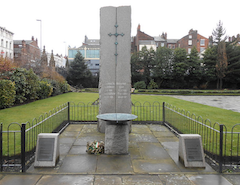Presidential freedom of expression

- The Great Hunger Memorial, St Luke’s Church, Liverpool, where President Higgins delivered his remarks.
(Image via Wikipedia)
Last week, the President of Ireland, Michael D Higgins, in response to questions from reporters during an official visit to Liverpool in the UK, made a number of unscripted remarks about a current political controversy in Ireland. The Presidency of Ireland is not an executive office in the same way as the Presidents of the US and France are – Ireland is a parliamentary democracy like the UK where the head of the executive is the Taoiseach (Prime Minister). Rather, the Presidency of Ireland is a largely ceremonial office, in much the same way as the Presidents of Italy and Germany are. As a consequence, the President’s remarks were seems as political and controversial. He denied overstepping the mark, and robustly defended his comments, but the incident has raised questions as to the limit of the President’s avowedly evolving role. Two articles recently published in the Irish Times neatly encapsulate the competing views. On the one hand, David Gwynn Morgan, Professor of Law Emeritus, UCC, argued that it was never intended for the president to act as a more effective opposition leader:
…Pitfalls of pushing out presidential boundaries
… the issue is whether he went beyond his proper authority.